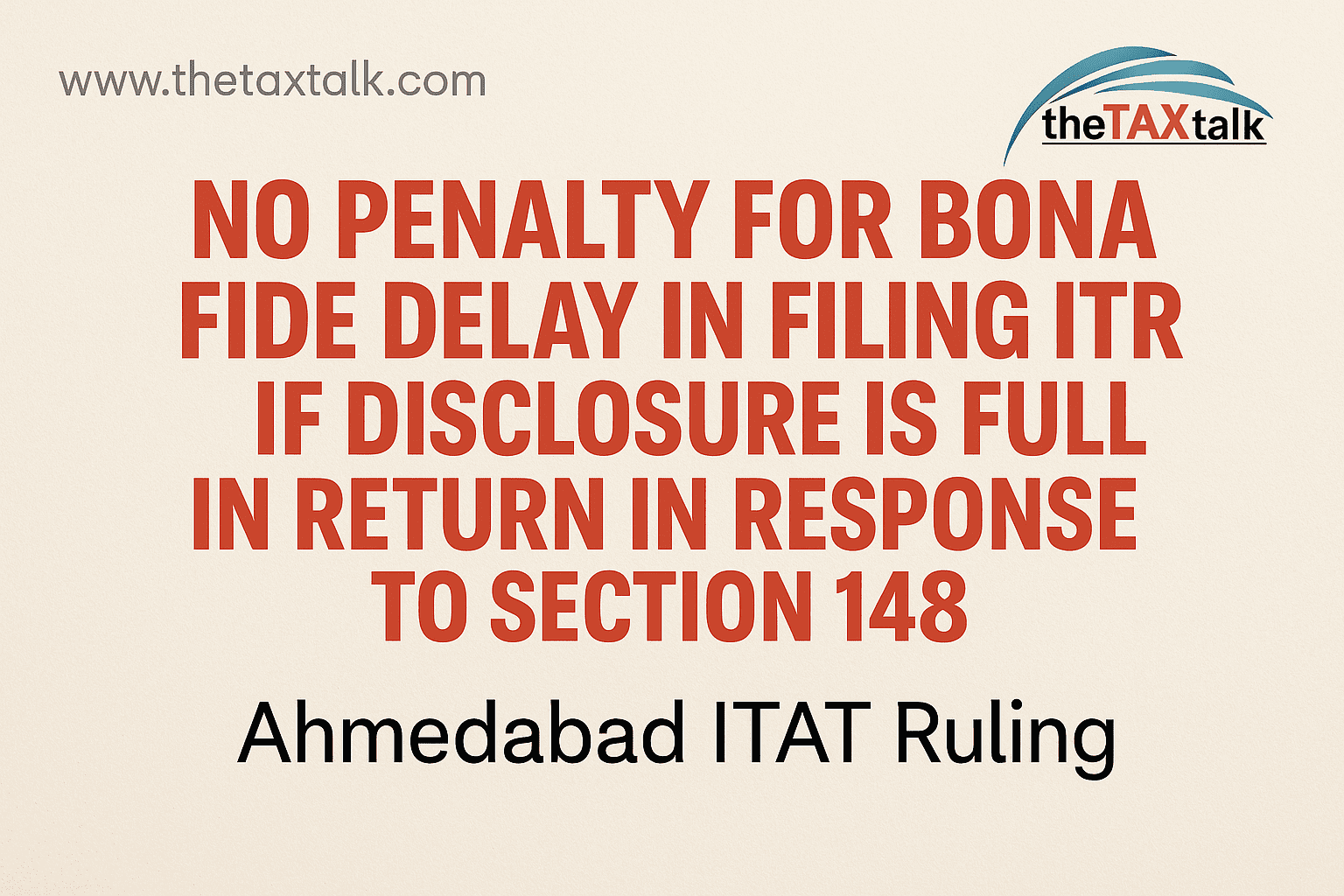![]()
No Penalty for Bona Fide Delay in Filing ITR if Disclosure is Full in return in response to section 148: Ahmedabad ITAT Ruling
In a significant and reassuring decision for taxpayers, the Ahmedabad Bench of the Income Tax Appellate Tribunal (ITAT) has held that no penalty under section 270A(2)(b) of the Income Tax Act can be levied for under-reporting of income if the return filed in response to a notice under section 148 contains full and true disclosure of income—even if such filing occurred after the due date under section 139(1).
Background of the Case
The case pertains to Ishit Kamleshbhai Sheth [ITA No.753/Ahd/2025], a salaried individual employed with Tech Mahindra. He had not filed his original return of income for the relevant assessment year under section 139(1).
Subsequently, based on information from Form 26AS and the Annual Information Statement (AIS), the Department initiated reassessment proceedings under section 148. The assessee then filed his return in response to this notice, fully disclosing his income, which was accepted without any variation by the Assessing Officer (AO).
However, the AO still levied penalty under section 270A(2)(b) on the ground that the return was filed only after receiving notice under section 148 and hence amounted to “under-reporting” of income.
Key Arguments and Tribunal Findings
The assessee argued that:
• The omission to file the return originally was bona fide, caused by oversight and not with an intent to evade taxes.
• All income was disclosed in response to the notice under section 148.
• Salary income had already been reported in the tax system via Form 26AS and TDS, thereby negating any attempt at concealment.
The CIT(A) upheld the penalty. However, the assessee escalated the matter to the ITAT, which overturned the penalty order with several critical observations:
ITAT’s Observations and Rationale
1. Penalty Cannot Be Levied Mechanically:
Section 270A is not a mechanical provision. The Tribunal emphasized that penalty under this section is discretionary and must be invoked based on substance over form. Just because the return was filed post-notice does not automatically imply under-reporting if the facts indicate otherwise.
2. Full Disclosure with No Income Variation:
The Tribunal noted that the return filed in response to the notice was accepted as-is, with no additions, disallowances, or modifications. The income was already visible in Form 26AS and backed by documents like salary slips, further proving there was no attempt to suppress income.
3. Bona Fide Explanation Acceptable:
The delay in filing was explained credibly as a genuine oversight, not a deliberate evasion. The assessee did not benefit from the delay nor did he mislead the Department.
4. Procedural Delay Not Enough to Penalize:
The Tribunal was clear that mere delay or failure to file the original return cannot equate to intentional under-reporting, especially when the eventual return discloses all income and complies with statutory requirements.
Key Takeaway: Compliance Even if Delayed, is Not Evasion
This ruling sends out a clear and taxpayer-friendly message:
Compliance with the tax laws—even if delayed—does not automatically equate to under-reporting or concealment, as long as the disclosure is full and true.
The ITAT’s balanced view gives much-needed relief to genuine taxpayers who may, due to unintentional errors or oversight, fail to meet procedural deadlines but ultimately comply in spirit and substance.
Final Word
This judgment sets a crucial precedent in favor of justice over technicality, ensuring that taxpayers who act in good faith and make full disclosures are not unfairly penalized. It also underlines the judiciary’s role in interpreting statutory provisions with fairness, recognizing that not every delay or omission is a sign of tax evasion.
With this ruling, salaried individuals and small taxpayers can breathe easier, knowing that honest compliance—even if not timely—will find judicial protection.
The copy of the order is as under:


